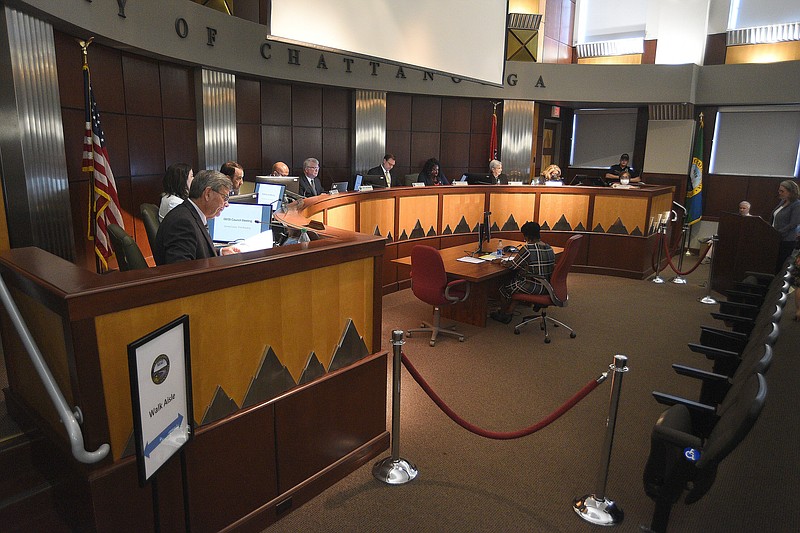Chattanooga leaders are considering a policy change that could support affordable housing efforts in the city, but they will likely wait until the amendment can receive further input from the city's incoming chief housing officer.
The Chattanooga City Council opted Tuesday to defer until next week a vote on proposed changes to the city's policies on special tax zones used to support development. The changes are designed to better align the city's rules for such zones with state law.
The tax districts are used by local governments to fund public infrastructure and facilities, capturing new tax revenue generated by development in a designated district for certain purposes. This type of financing generally helps spur private investment in blighted areas.
Jermaine Freeman, the senior adviser for economic opportunity for Mayor Tim Kelly, said the city's policy was initially adopted in 2015 and includes a blanket prohibition on any housing projects.
That is not the case under state law, which does allow the consideration of special tax district financing for multifamily housing for people with low-to-moderate incomes or for senior citizens and the disabled. City staff members want to adopt that language in Chattanooga's policy.
(READ MORE: Special tax district eyed on downtown Chattanooga's Westside)
"The reason for that is simple," Freeman said in an interview. "As we look to try to figure out ways of fighting for, preserving and creating more affordable housing options ... we want to make sure we have all the tools in the toolbox that are available."
Councilwoman Jenny Hill, of North Chattanooga, plans to bring a revised version of the policy changes to the panel next Tuesday. Her version would remove the green light for multifamily housing, giving city officials more time to further study that issue and make it part of their long-term changes to Chattanooga's rules for the special tax districts.
Hill said the city will have a chief housing officer coming on staff within the month. At that time, it would be appropriate for the city to review its policy and add language supporting use of revenue generated in the special tax districts for multifamily housing. The mechanism is known as tax increment financing because it captures incremental increases in tax revenue within the designated area.
"The reason that I want to hold that until we have our chief housing officer is because the rest of the policy is written in a way that's very economic development centric," Hill said. "We don't have any guardrails to ensure that a TIF application would align with our city's long-term affordable housing goals."
When the time comes, Hill said she wants to ensure the city is evaluating high-quality long-term housing tax increment financing.
"It's a super important piece that I am 100% behind," she said. "I just want to make sure we get it right."
(READ MORE: Groundbreaking on Chattanooga Lookouts stadium planned for April)
Freeman said the city's tax increment financing policy is a living, breathing document, and as officials continue to learn about the best way to use the funding tool, they will continue to find ways to improve it.
Once the city has a clear set of recommendations from the new chief housing officer and other stakeholders, Freeman said, they will come back to the council with additional changes to the policy specifically associated with multifamily housing.
Among other revisions, the changes council members will consider next week would also increase the application fee for tax increment financing from $1,500 to $8,000 and raise the annual administrative fee from 0.25% percent of the tax increment revenue to 2.5%, which Freeman said would help ensure the policy accounts for staff time and resources needed to manage a project.
"From our perspective, we wanted to just make sure that the new policy was in line with state statute as much as possible," Freeman said, "and then we also just wanted to acknowledge the fact that it just requires a great deal of staff time, and there is a corresponding cost that goes with that."
Contact David Floyd at dfloyd@timesfreepress.com or 423-757-6249. Follow him on Twitter @flavid_doyd.
